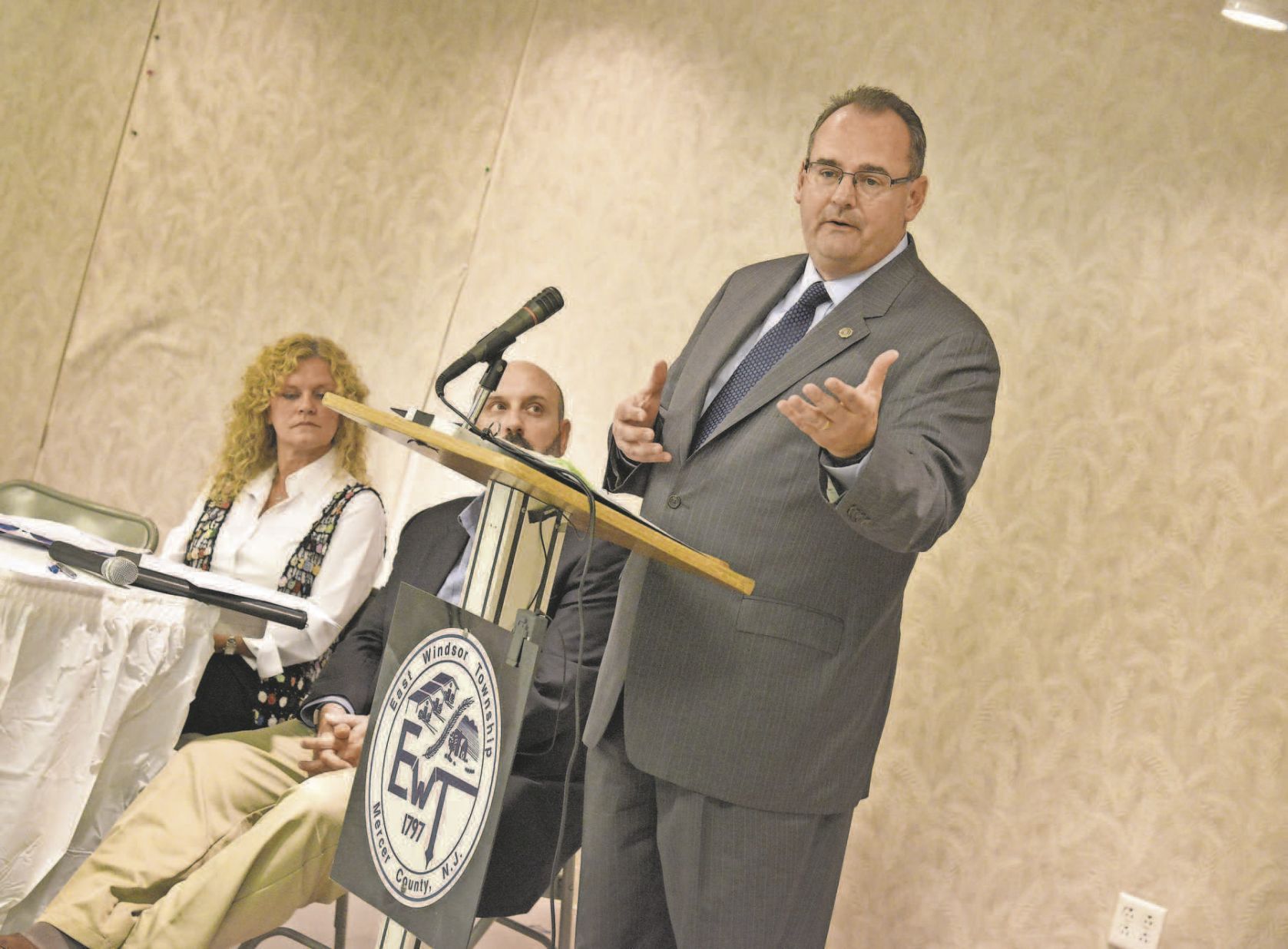By Lea Kahn, Staff Writer
Let there be no mistake. The opioid epidemic is real, and it is here.
That was the message delivered to attendees at the Knock Out Opioid Abuse Town Hall meeting at the East Windsor Senior Center Monday night.
Offering an overview of the epidemic and the response to it, the meeting was sponsored by East Windsor Township, the Mercer County Prosecutor’s Office, the Mercer Council on Alcohol and Drug Abuse, the East Windsor Municipal Alliance for the Prevention of Substance Abuse and the Prevention Coalition of Mercer County.
Setting the stage for the Town Hall meeting, Mayor Janice Mironov outlined the steps that East Windsor Township has taken to try to stem the problem – from the after-prom party for high school students, to the D.A.R.E. program for younger children and the drop box at the Police Department for unwanted or expired drugs.
Tammy Leigh, the assistant director of emergency services at Robert Wood Johnson University Hospital Hamilton, put the issue in perspective by noting that 62,000 people died from drug overdoses nationwide in 2015 – and another 500,000 people could die from it in the next decade. It is the leading cause of death among those under 50 years old.
To prevent potential addiction, emergency room physicians at the Hamilton Township hospital will not prescribe more than a five-day supply of opioid painkillers, Leigh said. The doctors’ logs are reviewed frequently to ensure that the drugs are not being over-prescribed.
But emergency rooms and doctors’ offices are not the only place where opioids can be obtained. There is plenty of it on the streets in the larger cities and in Trenton, as well, said Mercer County Prosecutor Angelo Onofri.
Heroin is a significant problem because it is cheaper than a pill, and it is readily available on the streets, Onofri said. Pills are much more expensive than a “deck” of heroin, which is about the size of a sugar packet.
Add to that the availability of Narcan, which is used to reverse overdoses and save lives, and it has become “somewhat of an invitation” to try heroin, Onofri said.
Yet, there should not be a stigma in asking for help, he said. All of the county prosecutors in New Jersey talk about addiction recovery and how to help addicts.
“We will never arrest or prosecute our way out of addiction,” Onofri said, despite the frequent drug busts and raids carried out by the Mercer County Prosecutor’s Office and the local police departments.
Assemblyman Dan Benson (D-14th Legislative District), who sat on the panel, pointed to landmark legislation that attempted to address the drug problem – making Narcan available to first responders, and assuring that someone who calls to report a possible drug overdose will not be prosecuted for doing so.
Now, state lawmakers may be faced with the decision to legalize marijuana, Benson said. It is not true that everyone who uses marijuana will go on to use other illegal drugs, but some will do so. He has not decided on his stance on the issue of legalization.
“We have a lot of work to do,” Benson said.
Barbara Sprechman of the Prevention Coalition of Mercer County pointed out an overlooked source of prescription painkillers – the medicine chest in houses that are for sale.
Realtors are being made aware to advise their clients – the homeowners – that they should lock the medicine chest when the house is being shown to prospective buyers during an open house, Sprechman said. Anyone who has access to the house also has access to the medicine chest, she said.
The same is true of the home of a recently deceased person, Sprechman said. People read the obituary notices and learn the time of the funeral, and that’s when the house may be burglarized to steal pills – especially if the person who died had been ill.
Overall, if steps can be taken to prevent a young person from experimenting with drugs or alcohol until he or she is at least 19 years old, they are less likely to become addicted, she said.
But what if, despite all efforts, someone becomes addicted?
Help is available, said John Mincarelli of Recovery Advocates. He is a recovering addict who began experimenting with drugs and alcohol as a pre-teen, and now he works with addicts who want to kick their habit.
Mincarelli advised parents to check their child’s cellphone and to check on their child’s bedroom for evidence of drug use, such as drug paraphernalia.
“You have the right as a parent to be a parent. If I am going to hurt your feelings to save your life, I’m going to hurt your feelings,” Mincarelli said, advising parents to disregard a child’s protestations.

